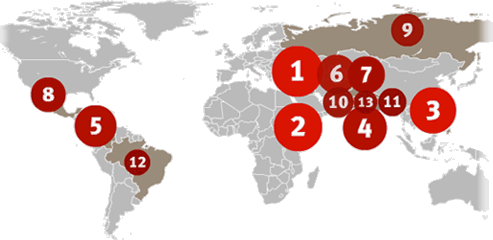Five journalists and a media worker were killed as Iraq maintained its position as one of the most dangerous countries for journalists. In August, the government adopted a law meant to offer journalists more protection, although its vague provisions did little initially to improve conditions. As demonstrations for economic and political reform spread with the Arab uprisings, journalists were consistently targeted for their coverage. Anti-riot police attacked, detained, and assaulted journalists covering protests. In their attempt to restrict coverage of the unrest, police raided news stations and press freedom groups, destroyed equipment, and arrested journalists. In Iraqi Kurdistan, authorities used aggression and intimidation to restrict journalists’ coverage of violent clashes between security forces and protesters. Gunmen raided and destroyed equipment of an independent TV station and a radio station in Sulaymaniyah. Three journalists were fired upon in separate episodes in March, while two journalists were injured covering clashes in Sulaymaniyah in April. Prominent Iraqi Kurdish journalist Asos Hardi was badly beaten by an unidentified assailant.
Iraq
» Nation remains among deadliest for journalists, with five killed in 2011.
» Central and Kurdish governments continue their crackdowns on critical journalists.
Five journalists and a media worker were killed as Iraq maintained its position as one of the most dangerous countries for journalists. In August, the government adopted a law meant to offer journalists more protection, although its vague provisions did little initially to improve conditions. As demonstrations for economic and political reform spread with the Arab uprisings, journalists were consistently targeted for their coverage. Anti-riot police attacked, detained, and assaulted journalists covering protests. In their attempt to restrict coverage of the unrest, police raided news stations and press freedom groups, destroyed equipment, and arrested journalists. In Iraqi Kurdistan, authorities used aggression and intimidation to restrict journalists’ coverage of violent clashes between security forces and protesters. Gunmen raided and destroyed equipment of an independent TV station and a radio station in Sulaymaniyah. Three journalists were fired upon in separate episodes in March, while two journalists were injured covering clashes in Sulaymaniyah in April. Prominent Iraqi Kurdish journalist Asos Hardi was badly beaten by an unidentified assailant.
-
1st
Impunity Index ranking -
5
Killed in 2011 -
66
Attacks in 2011 -
15,000
Syndicate members -
5.6%
Internet penetration
Not a single conviction has been obtained in a journalist murder since 2003, according to CPJ research. With an impunity rate three times worse than that of any other nation, Iraq was ranked worst in the world for the fourth straight year, CPJ research shows. The index calculates unsolved journalist murders as a percentage of each country's population.

| 1. Iraq 2. Somalia 3. Philippines 4. Sri Lanka | 5. Colombia 6. Afghanistan 7. Nepal 8. Mexico | 9. Russia 10. Pakistan 11. Bangladesh 12. Brazil | 13. India |
Since 2003, 150 journalists have been killed for their work in Iraq, the highest number of fatalities in a single country in the world, CPJ research shows. Fifty-four media workers have been killed, and an additional 24 journalists were killed in circumstances that remain unclear.
The 2011 victims include Hadi al-Mahdi, a radio show host; Alwan al-Ghorabi, a cameraman; and correspondents Muammar Khadir Abdelwahad, Sabah al-Bazi, and Mohamed al-Hamdani. Four of the 2011 victims were killed during insurgent attacks, reflecting the nation's continuing instability.
Journalists were targeted with detentions, raids, assaults, injuries, and obstructions for their news coverage, CPJ research shows. CPJ recorded attacks through October 2011.
Breakdown of attacks:
26: Detentions
10: Assaults
8: Equipment seizures or destruction
6: Killed (including one media worker)
6: Injured
5: Raids
2: Obstructions
3: Drive-by shootings
The Iraqi Journalists' Syndicate, an independent association, counted more than 15,000 members by late 2011. The syndicate pressured the government to pass a Journalist Protection Law, which was adopted on August 9.
New media laws in the region:
Saudi Arabia: May 2011 measure set punishments for publishing material that contravenes Sharia law.
Syria: August 2011 legislation banned content said to harm national security.
Algeria: December 2011 legislation could punish critical reporting.
Iraq had one of the lowest Internet penetration rates in the region. Only Sudan and Mauritania had a smaller percentage of inhabitants on the Internet, according to the International Telecommunication Union.
Regional ranking, from the lowest:
1: Sudan
2: Mauritania
3: Iraq
4: Yemen
5: Libya
